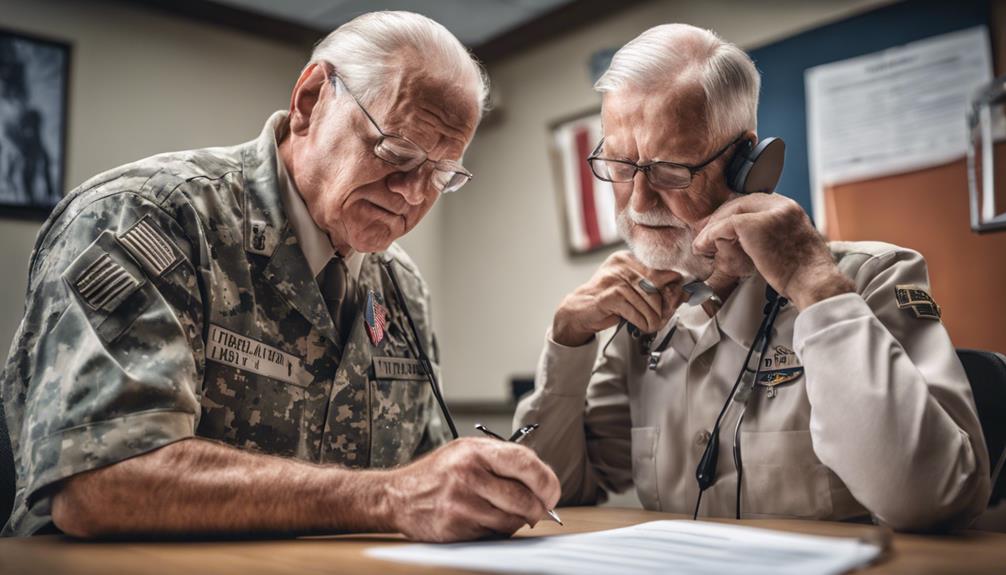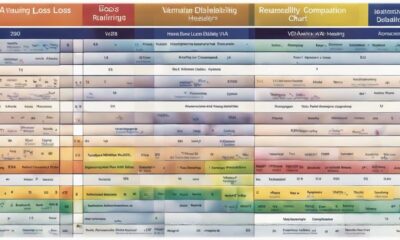Tinnitus
How You Can Get VA Disability for Hearing Loss and Tinnitus
Tackle the complexities of VA disability for hearing loss and tinnitus, unraveling the key steps for veterans seeking benefits.

Diving into the VA disability maze gets tricky, especially when tying hearing loss or tinnitus directly to military service. It’s key to grasp these fine details.
The journey to securing VA disability benefits for these conditions can be daunting, yet with the right knowledge and guidance, veterans can navigate the system effectively. Understanding the eligibility requirements, evidence needed for claims, and the appeals process is just the beginning; there are nuances that can significantly impact the outcome of a claim.
As we explore the avenues available to veterans seeking assistance on this matter, the path to securing VA disability for hearing loss and tinnitus becomes clearer.
Key Takeaways
- Provide current diagnosis evidence and establish service connection for VA disability.
- Detail in-service noise exposure and symptoms onset for tinnitus claims.
- Understand VA disability ratings criteria for hearing loss compensation.
- Seek professional help and gather strong evidence for appeals if denied benefits.
Eligibility Requirements for VA Disability
To be considered eligible for VA disability benefits for hearing loss and tinnitus, veterans must provide evidence of a current diagnosis and establish a service connection to their military service. This means that veterans need to have a documented diagnosis of hearing loss or tinnitus and show that these conditions are linked to their time in the military.
The VA uses specific tests and criteria to determine disability ratings for hearing loss and tinnitus. These ratings are crucial in establishing the level of compensation a veteran may receive. With a minimum disability rating and a verified service connection, veterans may qualify for VA disability benefits.
In FY 2020 alone, over 1.3 million veterans received benefits for hearing loss, while more than 2.3 million veterans were compensated for tinnitus. Understanding and meeting these eligibility requirements is essential for veterans to access the support and care they deserve for their service-related hearing impairments.
Evidence Needed for Hearing Loss Claim

Understanding the key evidence requirements for a successful VA disability claim for hearing loss is crucial for veterans seeking the assistance they deserve.
VA disability claims for hearing loss necessitate specific criteria such as in-service noise exposure, a current diagnosis from a licensed audiologist, and a nexus linking the hearing loss to military service.
To support a hearing loss claim, veterans should provide service records documenting exposure to loud noises, medical records confirming the current diagnosis, and lay evidence describing how the hearing loss impacts daily life.
Additionally, audiometric tests like the Maryland CNC and Pure-Tone Audiometric tests are essential to establish the severity of hearing loss for disability claims. It's vital to remove hearing aids during these tests for accurate results in determining the level of hearing loss for VA disability rating purposes.
Successful claims rely on a thorough presentation of evidence encompassing service connection, diagnosis, and the daily functional impact of hearing loss.
Establishing Service Connection for Tinnitus
When establishing service connection for tinnitus, veterans must provide compelling evidence linking their current diagnosis to specific events, injuries, or exposures encountered during their military service. This process involves demonstrating a clear nexus between the in-service event and the onset of tinnitus symptoms. To support their claim, veterans can present various forms of evidence, including medical records, service records, and buddy statements. By detailing the onset of symptoms, the severity of the condition, and any treatment received during service, veterans can strengthen their case for service connection. It is crucial for veterans to show that their tinnitus is related to their time in the military to be eligible for VA disability benefits. Here is a helpful table outlining key points to consider when establishing service connection for tinnitus:
| Key Points | Description |
|---|---|
| Evidence | Link current tinnitus diagnosis to military service events or exposures |
| Nexus | Clear connection between in-service event and onset of tinnitus symptoms |
| Supporting Documents | Medical records, service records, and buddy statements can strengthen claim |
| VA Benefits | Demonstrating tinnitus relation to military service is crucial for benefits |
| Symptom Onset | Detailing symptom onset, severity, and treatment received during service |
VA Disability Ratings for Hearing Loss

When determining VA disability ratings for hearing loss, veterans undergo specific tests that assess the level of impairment in each ear independently. These ratings are crucial as they determine the amount of compensation a veteran may receive. Here are some key points to understand about VA disability ratings for hearing loss:
- Ratings Range: The ratings range from 0% to 100%, with most veterans experiencing mild-to-moderate hearing loss often receiving a 0% or 10% rating.
- Severe Impairment: Severe hearing loss can lead to disability ratings between 30% and 50%, while a 100% rating is rare and typically requires profound loss in both ears.
- Difficulty in Achieving Higher Ratings: Achieving higher disability ratings can be challenging due to the stringent criteria based on the results of hearing tests.
Understanding these ratings and how they're determined is essential for veterans seeking service-connected compensation for auditory impairments like tinnitus.
Appeals Process for Denied Claims
Navigating the appeals process for denied claims related to hearing loss and tinnitus can be a challenging yet crucial step for veterans seeking the compensation they deserve. When facing a denial, it's essential to gather strong evidence to support your case. This may include the results of independent medical examinations detailing the extent of your hearing loss or tinnitus and how it impacts your daily life. By presenting compelling documentation, veterans increase their chances of securing better disability ratings.
For those struggling with denied claims, seeking assistance from accredited attorneys familiar with the VA appeals process can be invaluable. Organizations like Chisholm Chisholm & Kilpatrick LTD specialize in helping veterans navigate these complex procedures. Their expertise can make a significant difference in understanding the requirements, compiling necessary evidence, and presenting a compelling case for reconsideration. Remember, you don't have to face this process alone. Reach out to professionals who can support you every step of the way.
Frequently Asked Questions
Can You Get VA Disability for Both Hearing Loss and Tinnitus?
Yes, you can receive VA disability benefits for both hearing loss and tinnitus. The VA evaluates these conditions separately, allowing for compensation if each meets the service connection criteria. Veterans can have concurrent claims for both, leading to distinct disability ratings and compensation.
Medical evidence supporting the severity of each condition is crucial. The VA recognizes the coexistence of hearing loss and tinnitus, providing individual evaluations and compensation for each.
How Much Compensation Will I Get for Hearing Loss and Tinnitus?
We understand the concerns surrounding compensation for hearing loss and tinnitus.
The amount of compensation you receive for these conditions varies based on their severity, which directly impacts your monthly disability payments.
The VA evaluates each case individually, considering specific criteria and medical evidence. Veterans with profound hearing loss in both ears may qualify for a 100% disability rating, while tinnitus is typically rated at 10%.
It's crucial to provide detailed documentation to support your claim.
What Type of Hearing Loss Does Tinnitus Cause?
Tinnitus can cause sensorineural hearing loss, affecting the inner ear's ability to transmit sound. This type of hearing loss is due to damage in the inner ear's sensory cells or auditory nerve.
The persistent ringing or buzzing sounds from tinnitus can interfere with the brain's ability to process external sounds, leading to difficulties in hearing and understanding speech.
Seeking medical evaluation and support is crucial to address both conditions and improve overall auditory health.
How Do You Deal With Hearing Loss and Tinnitus?
Dealing with hearing loss and tinnitus can be challenging, but there are effective ways to manage these conditions. Seeking help from healthcare professionals, utilizing treatments like hearing aids or sound therapy, and practicing good hearing hygiene can all make a difference.
It's essential to stay informed, communicate your needs, and explore various options to find what works best for you. With patience and support, navigating hearing loss and tinnitus can become more manageable.
Conclusion
As we navigate the complex world of VA disability claims for hearing loss and tinnitus, remember that the process can be a maze of red tape.
But fear not, for with perseverance and guidance, we can unravel the tangled web of regulations and emerge victorious in our quest for rightful compensation.
So let's march forward, armed with knowledge and determination, towards a future where our voices are heard and our needs are met.
Tinnitus
How to Manage Mild Hearing Loss and Tinnitus With Hearing Aids
Discover effective strategies for managing mild hearing loss and tinnitus with hearing aids, offering valuable insights for improving your auditory well-being.

In the context of addressing mild hearing loss and tinnitus through the use of hearing aids, the adage ‘an ounce of prevention is worth a pound of cure’ remains applicable. Yet, what is one to do once these issues have already manifested, and the aim is to find effective strategies for dealing with them?
Well, let's explore some insightful strategies that could make a remarkable difference in your auditory well-being.
Key Takeaways
- Hearing aids reduce tinnitus annoyance and enhance hearing clarity.
- Tailored solutions based on individual needs and lifestyle improve management.
- Opt for advanced hearing aids with tinnitus-masking features for optimal results.
- Counseling and personalized fitting optimize tinnitus management with hearing aids.
Understanding Mild Hearing Loss and Tinnitus
Understanding mild hearing loss and tinnitus is crucial for individuals to effectively manage these conditions and improve their quality of life. Mild sensorineural hearing loss (MSNHL) affects a significant portion of the population, with 9-15% of individuals older than 15 years experiencing this condition. Tinnitus, characterized by the perception of sound without an external source, is prevalent in about 10-15% of the U.S. population and often coexists with hearing loss.
For those with MSNHL, seeking appropriate interventions like hearing aids can't only assist in managing hearing loss but also alleviate tinnitus symptoms. Despite the benefits that hearing aids offer in managing tinnitus, only 20% of individuals with sensorineural hearing loss opt for these devices.
Benefits of Using Hearing Aids

To effectively manage mild hearing loss and tinnitus, harnessing the benefits of using hearing aids is a pivotal step towards improving auditory function and quality of life. Hearing aids offer a range of advantages, including providing tinnitus relief by restoring auditory input and enhancing hearing clarity. Studies indicate that approximately 68% of individuals experience a reduction in tinnitus annoyance when using hearing aids, making them particularly effective for those with mild hearing loss. Furthermore, newer hearing aid models come equipped with sound therapy features that can help distract from tinnitus noises and promote relaxation. Collaborating with healthcare professionals allows for the development of personalized treatment plans that incorporate hearing aids, ensuring a tailored approach to managing tinnitus and hearing loss. By embracing the benefits of hearing aids, individuals can significantly improve their auditory experience and overall well-being.
| Benefits of Using Hearing Aids | |
|---|---|
| Tinnitus Relief | Sound Therapy |
| Mild Hearing Loss Management | Personalized Treatment Plans |
Choosing the Right Hearing Aid
Selecting the right hearing aid for managing mild hearing loss and tinnitus involves considering your individual hearing abilities, the severity of your tinnitus, and your lifestyle preferences.
When choosing a hearing aid, it's crucial to evaluate the sound frequencies affected by your tinnitus to ensure the device can effectively address those frequencies. Look for hearing aids with tinnitus-masking features, such as customizable sound therapy, to help distract from tinnitus sounds and provide relief.
Consulting with an audiologist is essential to ensure the hearing aid is tailored to your specific hearing needs and tinnitus symptoms. Opting for prescription hearing aids with advanced sound processing functions can offer better tinnitus relief and overall enhancement of your hearing experience.
Tips for Managing Hearing Difficulties

In managing hearing difficulties, positioning oneself in optimal listening environments can significantly reduce background noise and enhance communication clarity. Informing others about your hearing challenges is essential to foster understanding and facilitate effective communication.
Staying engaged in conversations by providing context can help overcome obstacles posed by mild hearing loss. Utilizing assistive devices such as hearing aids is crucial for amplifying sounds and improving hearing clarity during daily activities.
Consider exploring over-the-counter (OTC) hearing aids that offer features like volume control and compatibility with devices to manage mild hearing loss and tinnitus. These aids can provide tinnitus relief and enhance your overall auditory experience.
Improving Quality of Life With Hearing Aids
Enhancing the quality of life for individuals with mild hearing loss and tinnitus is a primary goal achieved through the effective use of hearing aids. Studies have shown that wearing hearing aids can lead to a significant reduction in tinnitus severity, as assessed by tools like the Tinnitus Handicap Inventory and Visual Analog Scale. Individuals experiencing untreated sensorineural hearing loss and chronic tinnitus can see notable improvements in tinnitus annoyance after six months of wearing hearing aids.
Psychoacoustic measurements, such as changes in tinnitus pitch and loudness, demonstrate the efficacy of hearing aids in managing tinnitus symptoms and enhancing overall well-being. Counseling sessions and personalized fitting of hearing aids are vital components in optimizing tinnitus management strategies. By utilizing these strategies, individuals can experience a substantial improvement in their quality of life, reducing the impact of tinnitus noises and enhancing their overall hearing experience.
Frequently Asked Questions
What Can You Do for a Minor Hearing Loss?
For minor hearing loss, we can explore various solutions. Seeking help from a professional audiologist is crucial. They'll assess your hearing and recommend appropriate interventions.
In some cases, hearing aids may be suggested to amplify sounds and improve communication. It's essential to address minor hearing issues promptly to prevent potential impacts on daily life.
Can Tinnitus Be Treated With Hearing Aids?
Yes, tinnitus can be treated with hearing aids. These devices amplify external sounds, diverting attention from tinnitus noises. By providing relief or reducing noticeability in 68% of cases, hearing aids offer customizable programming to mask tinnitus frequencies and promote relaxation.
Advanced sound processing functions in prescription hearing aids automatically adjust for optimal tinnitus management. Matching the frequency range of tinnitus sounds with the right hearing aids can effectively alleviate tinnitus symptoms.
How Do You Deal With Hearing Loss and Tinnitus?
Dealing with hearing loss and tinnitus can be challenging, but there are effective ways to manage these conditions.
Seeking professional help, such as consulting with audiologists for customized solutions, can greatly improve our quality of life.
Using hearing aids with sound therapy features and AI technology can provide relief by amplifying external sounds and distracting from tinnitus noises.
It's essential to explore options that match our specific needs to enhance our hearing experience.
Do Hearing Aids Help With Mild Hearing Loss?
Yes, hearing aids can greatly assist with mild hearing loss. These devices amplify sounds, enhancing clarity and comprehension. Studies indicate improved speech understanding and overall quality of life for individuals with mild sensorineural hearing loss.
In noisy settings, hearing aids are particularly effective, enabling better engagement in conversations and social interactions. They can also alleviate communication challenges and reduce annoyance from tinnitus.
Conclusion
In conclusion, embracing the benefits of using hearing aids can be a breakthrough in managing mild hearing loss and tinnitus. By choosing the right aid and working closely with healthcare professionals, we can navigate through the challenges and improve our quality of life.
Let's amplify our ability to enjoy sound and silence, and silence the struggles of tinnitus with the power of personalized hearing solutions.
Tinnitus
What VA Disability Benefits Cover Tinnitus and Hearing Loss?
Uncover the hidden truths behind VA Disability Benefits for tinnitus and hearing loss, revealing crucial insights that every veteran needs to know.

The adage goes, “Where there’s smoke, there’s fire,” right? This is particularly true in the context of VA Disability Benefits for tinnitus and hearing loss; there’s certainly more beneath the surface to investigate.
Understanding the intricacies of the application process and the criteria for eligibility is essential, especially when it comes to establishing a service connection. But what exactly do these benefits entail, and how can veterans navigate this complex system to ensure they receive the support they deserve?
Let's unpack the details and shed light on what lies ahead for those seeking assistance with these common service-related ailments.
Key Takeaways
- VA Disability Benefits cover tinnitus and hearing loss related to military service.
- Service connection evidence, medical records, and audiologist tests are crucial for benefits.
- Treatment options include hearing aids, cochlear implants, and corticosteroids.
- Understanding the VA benefits system and seeking guidance can improve benefit approval chances.
Causes of Tinnitus and Hearing Loss
Exposure to loud noises, such as gunfire and aircraft, is a prevalent cause of tinnitus and hearing loss among veterans. The constant barrage of noise in military environments can take a toll on our hearing, leading to long-term issues.
Moreover, the use of defective protective equipment, like the faulty 3M earplugs, has exacerbated auditory problems for many service members. Jet fuel exposure during our time in service is another factor that can contribute to hearing difficulties, including the development of tinnitus.
Additionally, blast injuries sustained during combat situations can result in inner ear damage, which manifests as both tinnitus and hearing loss. Furthermore, traumatic brain injuries that we might've experienced while serving increase the likelihood of developing hearing problems, such as tinnitus and hearing loss.
These various causes underscore the importance of recognizing and addressing the impact of military service on our auditory health.
Establishing Service Connection for Benefits

When establishing a service connection for VA disability benefits related to tinnitus or hearing loss, veterans must provide documented evidence linking their condition to their military service. This involves detailing specific in-service events, such as exposure to loud noises or combat situations, that may have led to the hearing loss. Medical evidence from licensed audiologists diagnosing the hearing conditions is crucial in this process.
Service records, medical records, and testimonies from fellow service members can also provide essential support for proving the connection between military service and tinnitus or hearing loss. The nexus between the current diagnosis of tinnitus or hearing loss, the documented in-service events, and the medical evidence is vital in establishing the service connection for VA disability benefits.
VA Disability Ratings for Tinnitus
Rating tinnitus for VA disability benefits typically falls under 38 CFR § 4.87 at a standard rate of 10%. Achieving a higher disability rating for tinnitus is challenging, with 10% being the most common rating granted.
While it's possible to relieve tinnitus symptoms, veterans rarely receive a disability rating higher than 10% for this condition. Tinnitus is one of the most claimed disabilities for VA compensation, highlighting its prevalence among veterans.
Despite the difficulties in obtaining higher disability ratings, it's essential for veterans experiencing significant tinnitus-related challenges to seek support and explore available resources.
Applying for VA Benefits Process

Understanding the intricacies of the application process for VA benefits related to tinnitus and hearing loss is crucial for veterans seeking compensation. When applying for VA benefits, veterans must establish a service connection, linking their hearing loss or tinnitus to their time in the military. This involves providing evidence of in-service events, a current diagnosis, and a nexus between the condition and military service.
Licensed audiologists conduct specific tests, such as audiometric tests, to diagnose and rate hearing loss and tinnitus accurately for VA benefits. Alongside test results, service records, medical documentation, and lay evidence are vital components of the application process. Meeting the criteria for disability ratings based on these factors is essential to receive compensation for tinnitus and hearing loss from the VA.
Veterans navigating this process may find it challenging, but with proper guidance and the necessary documentation, they can increase their chances of a successful application for VA benefits.
Treatment Options for Hearing Loss
Exploring a range of treatment options can significantly enhance the quality of life for individuals experiencing hearing loss. When addressing hearing loss, various interventions can play a crucial role in improving auditory function and overall well-being:
- Hearing aids: These devices amplify sounds, making them clearer and louder for the individual.
- Cochlear implants: Suitable for severe hearing loss, these electronic devices stimulate the auditory nerve directly.
- Corticosteroids: Prescribed to reduce inflammation in the ear, particularly beneficial for sudden sensorineural hearing loss.
- Auditory training and communication strategies: Rehabilitation programs that focus on improving listening skills and effective communication.
- Blockage removal: Procedures to eliminate physical obstructions in the ear canal, facilitating sound conduction.
In addition to these options, treatments like antibiotics for infections or diuretics for conditions like Meniere's disease can also help manage specific types of hearing loss. By combining medical interventions with auditory rehabilitation, individuals can work towards maximizing their hearing potential and quality of life.
Frequently Asked Questions
Can You Get VA Disability for Both Hearing Loss and Tinnitus?
Yes, we can receive VA disability benefits for both hearing loss and tinnitus if they're service-connected conditions. Tinnitus is usually rated at 10%, while hearing loss ratings vary.
It's common to have both due to shared risk factors. The VA acknowledges their impact and compensates accordingly. To qualify, veterans must establish a service connection and meet specific criteria.
It's crucial to seek support and explore all available benefits.
How Much Compensation Will I Get for Hearing Loss and Tinnitus?
We understand the concern about compensation for hearing loss and tinnitus. The amount of compensation varies based on the severity of the conditions. Mild-to-moderate hearing loss typically receives a 0% or 10% rating, while severe cases may range from 30% to 50%.
Tinnitus is usually rated at 10%. It's essential to seek a thorough evaluation by a VA healthcare provider to determine the appropriate compensation for your specific situation.
What Does 80% VA Disability Entitle You To?
At 80% VA disability, we're entitled to substantial benefits like enhanced healthcare coverage and vocational rehabilitation services.
This level of disability signifies significant impairment, allowing us access to special monthly compensation based on our unique circumstances.
These benefits provide vital support for our overall well-being and can assist us in achieving our career goals.
What Can Be Done for Hearing Loss and Tinnitus?
We understand the challenges of hearing loss and tinnitus. When addressing these issues, it's important to explore various treatments like hearing aids, cochlear implants, and progressive tinnitus management. These options can significantly improve daily life for many.
Seeking help is a crucial step towards better quality of life. Let's continue to support each other in managing these conditions with empathy and understanding.
Conclusion
In conclusion, it's important for veterans to understand the criteria for VA Disability Benefits covering tinnitus and hearing loss.
Did you know that nearly 2.7 million veterans receive disability benefits for hearing loss and tinnitus combined?
By seeking proper diagnosis, establishing service connection, and exploring treatment options, veterans can improve their quality of life and access the benefits they deserve.
Tinnitus
Understanding Hearing Loss and Tinnitus: A Self-Assessment Questionnaire
Delve into your auditory health with our self-assessment questionnaire, unraveling the mysteries of hearing loss and tinnitus for a clearer perspective.

Although the thought of using self-evaluation instruments might feel overwhelming, our survey provides an easy and efficient method for assessing your hearing and tinnitus issues.
As we navigate the intricacies of these common conditions, it becomes crucial to understand how they impact our daily lives.
This questionnaire serves as a starting point, prompting reflection on symptoms and their implications.
By taking this initial step, individuals can gain valuable insights into their auditory health, paving the way for informed decisions and potential solutions.
Key Takeaways
- Self-assessment tools aid in evaluating hearing loss and tinnitus symptoms accurately.
- Tinnitus impacts daily life, requiring effective management strategies.
- Seeking professional help, including audiologists, is crucial for tailored management plans.
- Regular use of self-assessment tools empowers proactive steps for better hearing care.
Importance of Self-Assessment Tools
Utilizing self-assessment tools is essential for individuals to evaluate their symptoms related to hearing loss and tinnitus accurately. These tools serve as a valuable initial step in assessing one's hearing health before seeking professional evaluation. By answering questions about sound perception, hearing difficulties, daily life impact, and family history of hearing issues, individuals can gain insights into potential hearing concerns. A single positive response in a self-assessment questionnaire may indicate the presence of hearing loss or tinnitus, highlighting the importance of further evaluation by a specialist.
Regular use of self-assessment tools enables individuals to monitor changes in their hearing status over time, empowering them to address any emerging issues promptly. These questionnaires offer a convenient and accessible means for individuals to take proactive steps towards better hearing care. By incorporating self-assessment tools into their routine, individuals can stay vigilant about their hearing health and make informed decisions regarding hearing evaluation and management.
Common Signs of Hearing Loss

An understanding of common signs of hearing loss is crucial for recognizing potential auditory challenges early on and seeking appropriate intervention. Here are some key signs to look out for:
- Difficulty understanding speech, especially in noisy environments.
- Asking others to repeat themselves frequently.
- Turning up the volume on electronic devices beyond what others find comfortable.
- Experiencing ringing in the ears, known as tinnitus.
These signs can manifest gradually, leading to missed sounds like doorbells or alarms, or suddenly after exposure to loud noises. Individuals with hearing loss may also struggle in social settings, feel isolated, and face challenges with phone conversations.
Recognizing these signs early and seeking professional help is essential to prevent further deterioration and improve overall quality of life. By being aware of these common signs, individuals can take proactive steps towards addressing potential hearing loss issues.
Impact of Tinnitus on Daily Life
Recognizing the impact of tinnitus on daily life is essential as it can significantly disrupt concentration, sleep quality, and emotional well-being. Individuals experiencing tinnitus may find it challenging to focus on tasks, leading to difficulty hearing and understanding conversations. This can result in heightened stress, anxiety, and irritability due to the persistent phantom sounds they hear.
Social interactions and work performance may also be affected, impacting overall quality of life. Sleep disturbances caused by tinnitus can further exacerbate these issues, leading to fatigue, mood changes, and decreased productivity during the day. However, effective tinnitus management strategies exist to help mitigate these challenges.
Steps to Take After Assessment

After undergoing a comprehensive assessment for hearing loss and tinnitus, we're ready to outline the necessary steps to effectively manage these conditions and improve our quality of life.
- Consider Hearing Aid: If recommended by your healthcare provider, using a hearing aid can help manage tinnitus by enhancing external sounds, reducing the perception of ringing or buzzing.
- Consult Audiologists: Seek guidance from audiologists specializing in tinnitus for personalized management plans and expert advice on coping strategies.
- Explore Comprehensive Evaluation: Opt for a thorough examination to identify the root cause of your hearing loss and tinnitus, enabling tailored treatment options.
- Try Tinnitus Retraining Therapy: Explore this therapeutic approach focused on habituation and sound enrichment to minimize the impact of tinnitus on your daily life.
Seeking Professional Help
Seeking professional help from experienced audiologists is essential for effectively managing tinnitus and improving your quality of life. Audiologists at Echo Hearing Center specialize in tinnitus management, providing expert support and personalized care.
By collaborating with audiologists, individuals can benefit from tailored tinnitus management plans that address their specific needs and the severity of their condition. It's crucial to seek professional help for effective tinnitus management and symptom reduction.
Taking charge of tinnitus begins with contacting audiologists for a comprehensive evaluation and exploring suitable treatment options. Expert assistance from audiologists can offer the necessary support and guidance to effectively manage tinnitus symptoms.
Frequently Asked Questions
How I Cured My Tinnitus Home Remedies?
We found relief from tinnitus through sound therapy, relaxation techniques, and stress management. Herbal supplements like ginkgo biloba or melatonin also helped some of us. Alternative approaches such as cognitive behavioral therapy (CBT) and acupuncture have been effective for others.
Maintaining a healthy lifestyle with regular exercise, a balanced diet, and adequate sleep can also contribute to managing tinnitus. It's crucial to consult with a healthcare provider before trying any home remedies for tinnitus for safety and effectiveness.
What Are the 4 Types of Hearing Loss?
There are four main types of hearing loss:
- Conductive hearing loss affects the outer or middle ear, hindering sound conduction.
- Sensorineural loss results from inner ear or nerve damage, disrupting sound signal transmission.
- Mixed hearing loss combines aspects of both conductive and sensorineural issues.
- Central hearing loss involves challenges with processing sound signals in the brain, impacting speech and sound comprehension.
What Is the Best Cure for Tinnitus?
When it comes to tinnitus, it's important to understand that there isn't a one-size-fits-all cure. However, various management strategies can help ease symptoms and enhance quality of life.
Common treatments include sound therapy, counseling, relaxation techniques, and hearing aids. Additionally, cognitive behavioral therapy (CBT) and mindfulness-based stress reduction (MBSR) have proven effective in managing tinnitus distress.
Some individuals also find relief through alternative treatments like acupuncture, hypnotherapy, or dietary adjustments. Ongoing research explores new treatments such as neuromodulation, medication trials, and innovative sound-based therapies.
How Can I Test Myself for Tinnitus?
When testing for tinnitus, we first recommend paying attention to any persistent ringing or buzzing sounds in your ears. Keeping track of how often these noises occur and whether they impact your daily activities can provide valuable insights.
It's vital to note any factors that seem to worsen or alleviate the symptoms. Consulting with a healthcare professional for a comprehensive evaluation is crucial for effective management and support.
Conclusion
In conclusion, self-assessment tools like the questionnaire provided can serve as valuable resources in understanding and managing hearing loss and tinnitus.
As the saying goes, 'knowledge is power,' and by taking proactive steps to assess our symptoms and seek professional help, we can empower ourselves to make informed decisions about our hearing health.
Remember, early intervention and collaboration with audiologists can lead to personalized management plans that improve our quality of life.
-

 Navigating the VA System1 month ago
Navigating the VA System1 month agoVA Hearing Loss Rating Chart: Understanding Disability Compensation
-

 Therapies and Interventions2 weeks ago
Therapies and Interventions2 weeks ago10 Auditory Processing Goals for Effective Speech Therapy
-

 Vetted2 months ago
Vetted2 months ago15 Best Oticon Hearing Aids to Improve Your Hearing in 2024
-

 Navigating the VA System1 month ago
Navigating the VA System1 month agoUnderstanding Bilateral Hearing Loss VA Rating Criteria
-

 Sign Language1 week ago
Sign Language1 week agoMastering the Art of Signing Letters in Sign Language
-

 Tinnitus1 month ago
Tinnitus1 month agoVA's Rating System for Tinnitus and Hearing Loss Explained
-

 Sign Language2 weeks ago
Sign Language2 weeks agoSign Language Emoji Translator: How to Communicate With Gestures
-

 Sign Language3 months ago
Sign Language3 months agoMedical Sign Language PDF: A Comprehensive How-To Guide

















